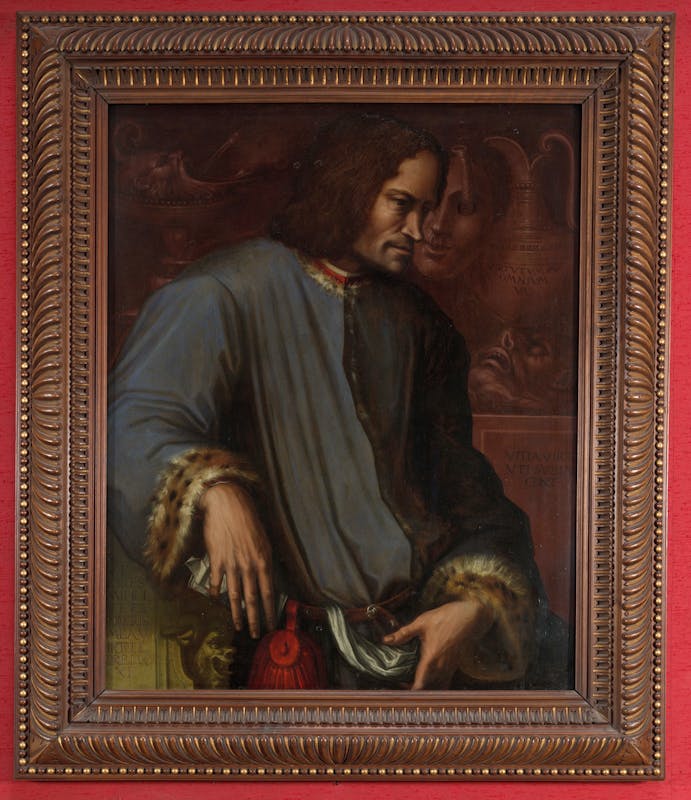The Prince - Niccolo Machiavelli
 |
| Niccolo Machiavelli Granger, 1820 steel engraving |
In The Prince, Machiavelli goes through all that a prince should and shouldn't do to maintain an effective control over his state. It was written in a style similar to that of the mirror for princes, which were a collection of advice a prince was expected to reflect. While both Machiavelli and the advice for princes theorists agreed on the goals a prince must attain, The Prince differed in that the means in which a prince should attain those goals, in fact Machiavelli himself states, "And because I know many have written about this, I fear that people will consider me presumptuous for doing so again, especially since considering this subject, I will depart from the rules given by others "(46). For this Machiavelli receives, even to this day, a lot of backlash, as he expected he would. He knew what he was writing might not go over very well but he continued to propose seemingly radical ways in which to a prince should maintain his state.
But Machiavelli's specific style of writing makes me wonder, perhaps he wrote The Prince as a satire. Or at the least, he did not mean to have any ruling body explicitly follow the "advice" he gave throughout. After all, he in part, wrote The Prince in hopes of gaining the Medici's favor in letting him back into Florence.
 |
| Lorenzo the Magnificent Giorgio Vasari, c 1533 The Uffizi, Italy oil on table, approx 90x72cm |
In the introductory letter to Lorenzo de' Medici, Machiavelli writes, "I, too, would like to commend myself to Your Magnificence with some token of my readiness to serve you" followed by, "My book is not stuffed with lengthy periods of bombastic, high-sounding works... for I wanted my book to be absolutely plain, or at least distinguished only by the variety of the examples and the importance of the subject" (3). This could be interpreted in one of the two ways, that Machiavelli sincerely meant to advise the Medici to the best of his abilities, or that he was mocking them in writing The Prince in such "plain" terms so that anyone might understand.
When one thinks about how it was the Medici that exiled him from his beloved Florence, it seems plausible that Machiavelli did not care for the Medici and their way of governing hence him written them a guide on how to effectively govern ones state.
When one thinks about how it was the Medici that exiled him from his beloved Florence, it seems plausible that Machiavelli did not care for the Medici and their way of governing hence him written them a guide on how to effectively govern ones state.
Now whether or not The Prince was written as a satire or serious political advice, Machiavelli never intended to glorify the image of a harsh and unjust prince, he believed that if one had to pick, it would be better to be feared than loved, only because the bonds of love that hold a prince and his subjects together were weaker than those of fear. With that said, Machiavelli also stated, "And if he is obliged to take to shed someone's blood, he should do so when proper justification and manifest cause" (53). Machiavelli understood the nature of mankind, while it might be pessimistic, it is realistic, a fear of punishment tends override any superficial love. He also states, "A prince must also how himself a lover of virtue, give recognition to virtuous men, and honor those who excel in particular art" (73). Machiavelli understood the important of a the acknowledging the important of art and the talents of ones subjects. After all, it is for the subjects that the prince does what he does. To declare Machiavelli promoted a cruel and tyrannical state is not only a gross misinterpretation of his work, but also quite the slander.
Just as beauty is in the eye of the beholder, the true meaning of The Prince is that which you make it, but with that being said, the context and intent with which Machiavelli wrote The Prince, must also be taken into consideration. Whether or not you agree with Machiavelli, The Prince is an interesting read that leaves you pondering the intricacies with which governing bodies operate.
“Albergaccio, Machiavelli’s House, San Casciano in Val Di Pesa, Florence, Tuscany, Italy, Europe.” YouTube, 2014, youtu.be/hDkBbWvjEck. Accessed 28 Sept. 2020.
Kniatt, Stacey. “Machiavelli’s The Prince as a Satire: An Exploratory Look at Machiavelli’s Works to Determine His True Political Inclinations.” Eaglefeather.Honors.Unt.Edu, 2007, eaglefeather.honors.unt.edu/2007/article/233#.X3BfxD-SnIU. Accessed 28 Sept. 2020.
Niccolò Machiavelli, and Wayne A Rebhorn. The Prince : A Revised Translation, Backgrounds, Interpretations. New York, W.W. Norton & Company, 2020.
“Portrait of Lorenzo the Magnificent by Giorgio Vasari.” Painting-Planet.Com, painting-planet.com/portrait-of-lorenzo-the-magnificent-by-giorgio-vasari/. Accessed 28 Sept. 2020.
Valentina. “Lorenzo: The Medici Who Was Magnificent.” The Medici Dynasty Show, 10 July 2017, medicidynasty.com/lorenzo-the-medici-who-was-magnificent/.